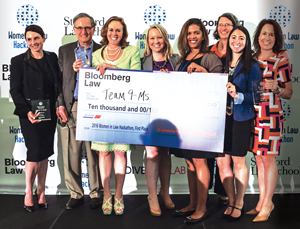Women in Law Hackathon address compensation, advancement and business development

Copyright© Marco Zecchin
Over the course of six months, teams participating in the first-ever Women in Law Hackathon devised new ways to disrupt the diversity dialogue at elite law firms and close the gender gap.
The hackathon was a Shark Tank-style competition conceived by Diversity Lab in partnership with Stanford Law School and Bloomberg Law. Bloomberg contributed cash prizes for the three winning ideas, with the funds donated to nonprofit organizations helping to advance women in the legal profession and beyond.
The $10,000 top prize went to a platform called SMART (Solutions to Measure, Advance and Reward Talent), which is intended to revolutionize firm revenue models by balancing contributions and credit, realigning rewards with value systems and rewarding nonbillable work that adds value to the firm.
The gender-neutral reporting system includes an app and dashboard. It allows firms to determine compensation and advancement based on eight “pillars”: billable and pro bono hours, business development, advancement of diversity, quality of work, client satisfaction, lawyer development, leadership and initiative, and external visibility.
The team that won the $7,500 second-place prize also focused on ways to hack compensation, along with changing the model for origination credit.
“Our team solution for the hackathon focused on how we could upset the applecart in terms of how credit is passed along in law firms, so that we can close the pay equity gap between men and women partners,” explained recent Stanford Law graduate Erika Merit Douglas.
Power Development Program, Douglas’ team, pairs two generations of female lawyers—a partner and an associate—with an institutional client for a 12-month period. At the end of the year, the partner earns economic credit on the relationship team for that client, expanding her economic influence at the firm and her value as a key partner for the client.
The third-place prize, and $5,000, went to the Five Year Moment, which applies metrics and experiential solutions with the aim of eliminating systemic and individual barriers to business development success for female lawyers.
Hackathon participants included 54 law firm partners, 18 diversity experts, and nine Stanford Law students broken up into teams of nine, working virtually over the course of six months to create solutions.
“Through the hackathon, we brought together an unprecedented concentration of brainpower to tackle this issue,” says Diversity Lab founder and CEO Caren Ulrich Stacy. “We are grateful for the incredibly hard work put in by all of the hackathon teams. And, thanks to Bloomberg Law, we have the necessary funds to support and implement the hackathon ideas going forward.”
This article originally appeared in the October 2016 issue of the ABA Journal with this headline: “Hacking the Gender Gap: Teams work to devise solutions to issues of compensation, advancement and business development.”



